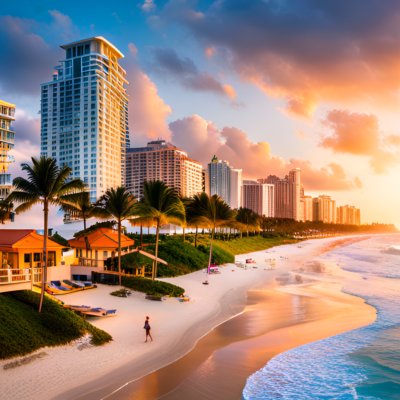As of my last knowledge update in September 2021, I can provide you with some general insights into the business environment in South Florida and how it relates to rental or vacation properties. However, please note that economic conditions and real estate markets can change over time, so it’s important to verify this information with more recent sources.
South Florida Business Environment:
South Florida has historically been known for its vibrant business environment, which is heavily influenced by its tourism, real estate, and international trade sectors. The region’s strategic location, diverse population, and warm climate have contributed to its economic growth. Major cities in South Florida, such as Miami, Fort Lauderdale, and West Palm Beach, are important hubs for various industries, including finance, technology, healthcare, and hospitality.

Tourism and Vacation Properties:
Tourism plays a significant role in South Florida’s economy, attracting millions of visitors each year to its beaches, cultural attractions, and entertainment venues. This robust tourism industry has driven demand for vacation properties, including rental homes, condos, and beachfront villas. Many investors have taken advantage of this demand by purchasing properties for short-term rentals through platforms like Airbnb and VRBO.
Rental Properties:
Rental properties, both residential and commercial, have been a key component of South Florida’s real estate market. The diverse population, influx of migrants, and seasonal residents contribute to the demand for rental housing. In urban centers like Miami, rental properties are in high demand due to the city’s role as a business and cultural hub.
Real Estate Market Trends:
The South Florida real estate market has experienced fluctuations over the years. Factors such as changes in interest rates, economic conditions, and global events can influence property values and rental demand. Before investing in rental or vacation properties in South Florida, it’s important to conduct thorough market research and consider working with real estate professionals who have local expertise.
Regulations and Legal Considerations:
Investors in rental and vacation properties need to be aware of local regulations, zoning laws, and any restrictions on short-term rentals. Some municipalities in South Florida have imposed regulations or licensing requirements on short-term rentals to address concerns about noise, property upkeep, and neighborhood character.
COVID-19 Impact:
It’s worth noting that the COVID-19 pandemic had a significant impact on the tourism and real estate sectors, including vacation and rental properties. Travel restrictions, lockdowns, and reduced travel demand led to disruptions in the short-term rental market. However, as travel and tourism rebound, the market for vacation properties may also recover.
In conclusion, South Florida’s business environment is closely tied to its tourism, real estate, and hospitality sectors. The region’s attractiveness as a tourist destination has fueled demand for both vacation and rental properties. However, like any real estate market, it’s important for investors to stay informed about market conditions, regulations, and economic trends before making investment decisions. For the most up-to-date and specific information, I recommend consulting real estate professionals and local market reports.